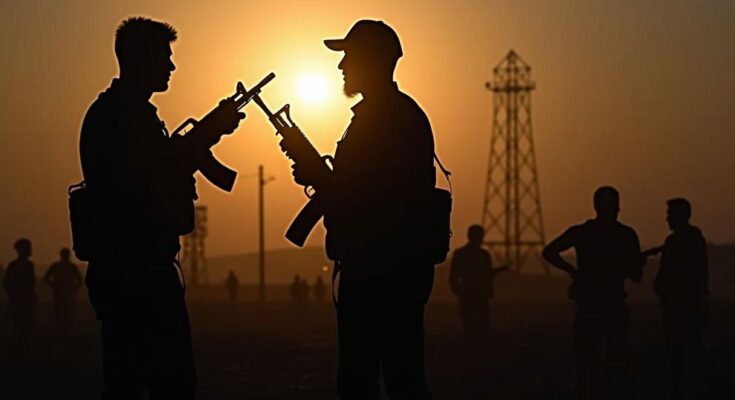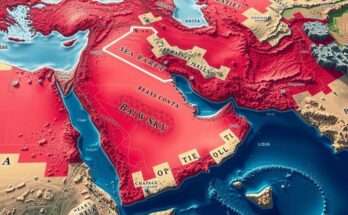Libya’s chief prosecutor has ordered the detention of militia leader Mohamed Bahroun and an associate for their involvement in the assassination of Abdel-Rahman Milad, a prominent human trafficker. Milad, previously sanctioned by the UN and implicated in severe trafficking activities, was fatally shot in Tripoli. The case highlights ongoing concerns regarding the Libyan coastguard’s role in trafficking and the complexities of EU-Libyan cooperation.
In a significant turn of events, the Libyan chief prosecutor has ordered the detention of militia leader Mohamed Bahroun and one of his aides in connection with the assassination of Abdel-Rahman Milad, a notorious human trafficker operating in Libya. Both Bahroun and his associate surrendered to authorities following accusations regarding their involvement in the killing of Milad, who was shot dead while seated in a car in Tripoli. Milad, also known as “Bija,” was previously identified by the United Nations as a key player in human trafficking networks and had been sanctioned by the UN Security Council. Milad commanded a coastguard unit based in Zawiya and had been implicated in egregious acts, such as intentionally sinking migrant vessels. He had been arrested in 2019 after being located at a clandestine meeting in Sicily involving Libyan coastguard officials and members of Italian authorities. This meeting arose from a contentious agreement in 2017 that promised enhanced cooperation between the Italian government and Libya’s coastguard to stem migratory flows across the Mediterranean Sea. Despite his arrest and claims of being involved in trafficking, Milad was promoted in rank following his release from prison in 2021 and allegedly maintained close ties with the authorities, all while denying any connection to human trafficking. Peter Stano, a spokesman for the European Union, asserted the EU’s commitment to supporting Libya in prosecuting those responsible for human trafficking activities, including Milad, who was also sanctioned by the EU in 2018. However, rights organizations have criticized the EU’s approach, highlighting that migrants often face egregious abuses in detention centers after interception by the Libyan coastguard. The head of the Sadeq Institute, Anas El Gomati, remarked on the unfortunate cycle wherein funds intended to aid migrants instead empower traffickers, stating that Milad had effectively “turned rescue into ransom.” He elaborated that intercepted migrants, returned to Libya, frequently find themselves extorted in detention centers. Libya serves as a critical route for individuals from Africa and the Middle East seeking to reach Europe, navigating perilous waters in ill-equipped vessels. Recent instances, such as the interception of 64 migrants and a tragic capsizing incident off Tobruk resulting in numerous missing persons, reaffirm the ongoing crisis in the region.
The situation surrounding human trafficking in Libya is deeply entrenched and complicated by the country’s political instability. Libya has become a primary transit point for migrants from various African and Middle Eastern nations aiming to cross the Mediterranean Sea toward Europe. This journey is fraught with peril, as migrants often utilize precarious and overcrowded vessels that are susceptible to capsizing. The national coastguard, although ostensibly tasked with protecting maritime borders and saving lives, has been implicated in actions that favor traffickers. Allegations have surfaced regarding the use of EU resources originally intended for humanitarian purposes to assist these traffickers, leading to a cycle of violence and exploitation. Furthermore, the convoluted nature of cooperation between Libyan authorities and international entities, particularly the EU, has sparked criticisms, as the latter’s measures often reflect failure to safeguard migrant rights or provide adequate support during their ordeals.
The recent detention of militia leader Mohamed Bahroun and his associate marks a pivotal development in Libya’s ongoing battle against human trafficking. The high-profile killing of Abdel-Rahman Milad, a sanctioned trafficker, raises critical questions about the effectiveness of international collaboration in addressing the trafficking crisis. The circumstances surrounding Milad’s activities and his connections to both Libyan and Italian authorities exemplify the complex interplay of power, corruption, and humanitarian concerns in the region. As Libya continues to serve as a key pathway for precarious migration routes to Europe, the systemic issues that allow these atrocities to persist must be confronted with urgency and vigilance.
Original Source: www.euronews.com




